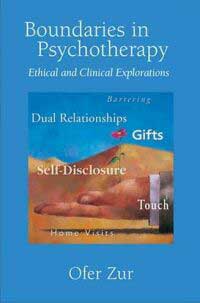 280 pages
280 pages9 CE credits
Course Enrollment
$210.00
Add to Cart
All exams are taken online. The exam for this course will be available in "My Courses" immediately upon enrollment. Note the book is not included.
The book is available for purchase from Amazon.
As an Amazon Associate we receive a rebate from qualifying purchases.
A New York State licensee is responsible for complying with New York Laws, rules and regulations. You may want to consult the Office of the Professions website which provides information about professional practice in NYS.
BOUNDARIES IN PSYCHOTHERAPY
Ethical and Clinical Explorations
Ofer ZurAmerican Psychological Association, 2007
DESCRIPTION
A client wishes to pay for therapy services by bartering his original artwork. A therapist accepts a client's hug. A client asks his or her therapist if they can be friends after therapy ends. A prospective client requests therapy from a therapist who is also her neighbor. A client inquires about a therapist's spiritual orientation. What is the best course of action in these difficult situations? This book is for the professional who feels unsure when entering the gray areas that inevitably arise in psychotherapy practice. The author carefully differentiates between what constitutes appropriate and helpful boundary crossing rather than inappropriate boundary violation and explores the ethical and clinical complexities involved in boundary issues such as the exchange of gifts, nonsexual touch, therapists' self-disclosure, dual relationships, bartering, home visits, home office practice, and telehealth. This book does not offer simple answers but, rather, examines the nature of boundaries in psychotherapy and helps readers view boundaries through both an ethical and a clinical lens. Readers will learn a decision-making process to help them think through when to cross and when not to cross a boundary. Examples of real-world situations are provided to aid therapists as they think critically about what is most appropriate and most helpful to their clients' well-being. Clinicians, trainers, supervisors, instructors, students, ethicists, licensing boards, administrators, and attorneys will appreciate this thoughtful orientation to the many different boundaries that surround and protect psychotherapists and their clients.
EDUCATIONAL OBJECTIVESThe reader will be able to:
• Assess and differentiate helpful versus inappropriate boundary crossing in such activities as the exchange of gifts
• Describe aspects of the nonsexual touch
• Define the salient issues in therapists' self-disclosure
• Examine aspects of dual relationships
• Make decisions on bartering, home visits, home-office practice, and 'telehealth'
AUTHOR
Ofer Zur, Ph.D., is a licensed psychologist, instructor, forensic and ethics consultant, and expert witness in private psychotherapy practice. He taught at the graduate level at the California School of Professional Spychology in Alameda and the California Institute of Integral Studies in San Francisco. He is the director of the Zur Institute.
EDITORIAL REVIEWS"This is a book that should be read by all professional psychologists and would be useful as a resource in ethics courses. I recommend it highly."
--Cognitive Behavioral Therapy Book Reviews
"In summary, this is a very well-organized, well-written, and thought-provoking book. It is a book to be read, thought about, and discussed with colleagues. I would enthusiastically recommend it to all clinicians, regardless of theoretical orientation or level of practice."
--The American Journal of Clinical Hypnosis
ISHK CE at Home
1702-L Meridian Ave., #266
San Jose, CA 95125-5586
This website uses cookies to ensure you get the best experience on our website. Learn more
